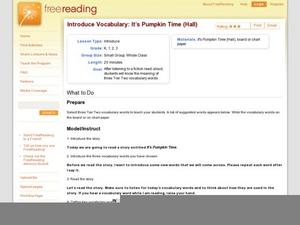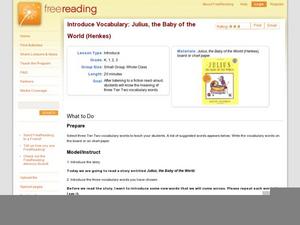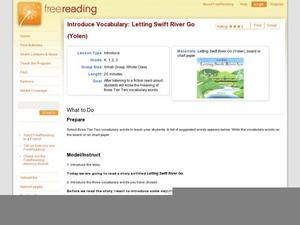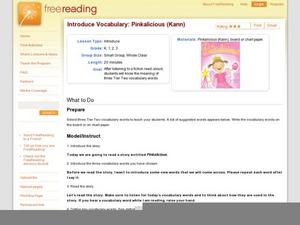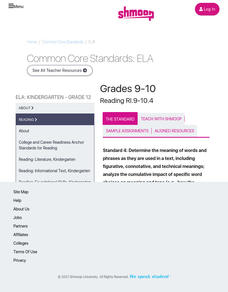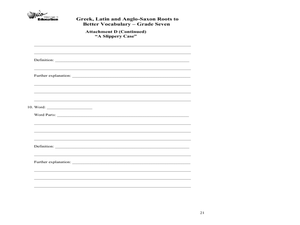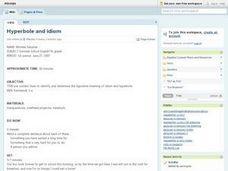Curated OER
Introduce Vocabulary: It's Pumpkin Time (Hall)
Looking for a Halloween-themed vocabulary lesson? Study words in context using Zoe Hall's story It's Pumpkin Time, an excellent informational text for budding readers. The spooky suggested words are: buds, gather, hollow,...
Curated OER
Introduce Vocabulary: Julius, the Baby of the World (Henkes)
Lilly is jealous when her new little brother is born; explore vocabulary in context through Kenvin Kenkes' story Julius the Baby of the World. Suggested words for this text are: constantly, disguise, disgusting, extraordinary, quiver,...
Curated OER
Introduce Vocabulary: Letting Swift River Go (Yolen)
If your class is reading Jane Yolen's Letting Swift River Go, explore these vocabulary words in context: faint, quench, remain, and sacred. Before reading the story aloud, acquaint learners with these words briefly. As you read,...
Curated OER
Introduce Vocabulary: Miss Bindergarten Stays Home (Slate)
What is Miss Bindergarten up to now? Joseph Slate's story Miss Bindergarten Stays Home is an excellent resource for budding readers to practice five vocabulary words in context: advise, lesson, lovely, strum, and substitute. As they...
Curated OER
Introduce Vocabulary: One Hungry Monster (O'Keefe)
Combine counting and vocabulary practice with Susan O'Keefe's engaging story One Hungry Monster, which you can find on YouTube if needed. Introduce learners to the following in-text words: doubt, gargle, rude, swear, and underneath....
Curated OER
Introduce Vocabulary: Pinkalicious (Kann)
Although the title of Elizabeth Kann's story Pinkalicious isn't a real word, the book is an excellent way to explore some new vocabulary in context: acute, mushy, rare, steady, and surrounded. Find the story free on YouTube if you don't...
Curated OER
Introduce Vocabulary: Some Birthday! (Polacco)
Patricia Polacco weaves an engaging tale for budding readers in her book Some Birthday!, an excellent resource for vocabulary in context. You can use this text to introduce the following words: investigate, snarl, and squawk. After a...
Curated OER
Introduce Vocabulary: A Day at the Apple Orchard (Faulkner and Krawsky)
If your class is reading A Day at the Apple Orchard by Megan Faulkner, be sure to use this guide for vocabulary in context. Go over the orchard-related terms (cycle, harvest, orchard, pollen, and ripen) before reading the story aloud....
Curated OER
Introduce Vocabulary: Froggy Goes to School (London)
Just like your budding readers may have felt, Froggy is nervous on his first day of school. Use Johnathan London's book Froggy Goes to School to practice vocabulary in context. Prior to reading the story aloud, pre-teach the new words...
Curated OER
Introduce Vocabulary: Jonathan and His Mommy (Smalls)
Go on a walking adventure through Irene Smalls' touching book Jonathan and His Mommy, an excellent resource to practice vocabulary in context. Go over the walking-themed terms (humongous, pace, leap, and zigzag) learners will hear before...
Curated OER
Introduce Vocabulary: Lilly's Purple Plastic Purse (Henkes)
Familiarize budding readers with new vocabulary in context as they listen you read Lilly's Purple Plastic Purse, which can be found on YouTube if you don't have in on hand. Recommended focus words here are: considerate, creative,...
Curated OER
Introduce Vocabulary: Make Way for Ducklings (McCloskey)
Use the Caldecott Award-winning book Make Way for Ducklings by Robert McCloskey (which can be found on YouTube if you don't have it) to guide budding readers through vocabulary in context. Although the instruction here is limited to the...
Shmoop
ELA.CCSS.ELA-Literacy.RI.9-10.4
Your pupils will be expected to determine the meaning of words and how those words affect the meaning of a text. Help them master this skill with the ideas listed here. First, look over the two activities that could be used for your...
Curated OER
Simile and Metaphor
Middle schoolers use context clues to find the figurative meaning of similes and metaphors in writing. They practice using figurative language to help their writing come alive. Use this activity in a lesson about poetry, figurative...
Curated OER
Synonyms and Antonyms
Mix up your writing lessons by having kids look at recent newspaper articles instead of their own work. They work in pairs and rewrite sports news articles using synonyms and antonyms for a set number of words. Then they share their work...
Curated OER
Greek, Latin and Anglo-Saxon Roots to Better Vocabulary
Practice vocabulary skills with this word analysis lesson. Middle schoolers examine the roots of unfamiliar words and use their knowledge of roots to discern meaning through word analysis.
Curated OER
Vocabulary Game
Help scholars discover new ways to build their vocabulary. Groups create a game involving their vocabulary words. Using the jigsaw model, the groups shuffle and play the games of the other groups. Save the games and use them for other...
Curated OER
It's Opposite Day
Celebrate Opposite Day by using a Visual Thesaurus to match words to their antonyms. They match a list of vocabulary words to their antonym counterparts using the Visual Thesaurus, and then they play Antonym Bingo with the words from...
Curated OER
Hyperbole and Idiom
Seventh graders use context clues to determine the figurative meaning of idioms and hyperboles. They practice writing idioms and hyperboles in sentences about real life situations around them. This lesson is a good way to improve variety...
Curated OER
Multiple Meanings Game
Here is a simple activity that uses definition cards that match the appropriate words to their meaning. Pupils match the cards using vocabulary words from units of study. A very basic, but often useful, resource.
Ohio Department of Education
Word Origins
Understanding a word's etymology can really help with decoding and building vocabulary skills. Readers compare and contrast words of similar origins but with different difficulty levels. They focus on prefixes, suffixes, and affixes....
Curated OER
Dead Word Wall Kills Overused Words
Have your class attend a funeral for the words they overuse in their writing. They develop a list of alternate words for those overused words, and make an effort to employ alternatives whenever possible. This is a great way to improve...
Curated OER
Mythological Word Origins
No wonder the ship was called the Titanic. An investigation of Norse, Roman, and Greek Mythology provides insight into mythological characters and corresponding words in the English language. A close look at roots, prefixes, and suffixes...
Curated OER
Inferring Vocabulary Meaning
Explore the meaning of unknown words! Read All I See with your class, having them complete the inference chart provided while reading. They select unknown words, guess their meanings, and identify what other words or pictures helped them...
Other popular searches
- Multiple Word Meanings
- Word Meanings in Context
- Foreign Word Meanings
- Word Meanings From Context
- Similar Word Meanings
- Clarify Word Meanings
- Vocabulary. Word Meanings
- Word Meanings Lesson Plans
- Glossary Word Meanings
- Meanings of Word Parts
- Word Meanings/definitions
- Multiple Word Meanings 4th


